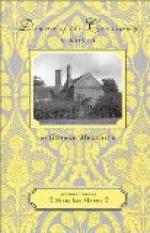Lady Wathin’s eyelids worked and her lips shut fast at the cold-hearted remark void of meaning.
She sighed. ‘So ends a life of misery, my dear!’
‘You are compassionate.’
’I hope so. But . . . Indeed I must speak, if you will let me. I think of the living.’
Lady Dunstane widened her eyes. ‘Of Mrs. Warwick?’
’She has now the freedom she desired. I think of others. Forgive me, but Constance Asper is to me as a daughter. I have perhaps no grounds for any apprehension. Love so ardent, so sincere, was never shown by bridegroom elect: and it is not extraordinary to those acquainted with dear Constance. But—one may be a worshipped saint and experience defection. The terrible stories one hears of a power of fascination almost . . . !’ Lady Wathin hung for the word.
‘Infernal,’ said Lady Dunstane, whose brows had been bent inquiringly. ’Have no fear. The freedom you allude to will not be used to interfere with any entertainment in prospect. It was freedom my friend desired. Now that her jewel is restored to her, she is not the person to throw it away, be sure. And pray, drop the subject.’
‘One may rely . . . you think?’
‘Oh! Oh!’
‘This release coming just before the wedding . . . !’
’I should hardly suppose the man to be the puppet you depict, or indicate.’
’It is because men—so many—are not puppets that one is conscious of alarm.’
‘Your previous remark,’ said Lady Dunstane, ’sounded superstitious. Your present one has an antipodal basis. But, as for your alarm, check it: and spare me further. My friend has acknowledged powers. Considering that, she does not use them, you should learn to respect her.’
Lady Wathin bowed stiffly. She refused to partake of lunch, having, she said, satisfied her conscience by the performance of a duty and arranged with her flyman to catch a train. Her cousin Lady Dunstane smiled loftily at everything she uttered, and she felt that if a woman like this Mrs. Warwick could put division between blood-relatives, she could do worse, and was to be dreaded up to the hour of the nuptials.
‘I meant no harm in coming,’ she said, at the shaking of hands.
‘No, no; I understand,’ said her hostess: ’you are hen-hearted over your adopted brood. The situation is perceptible and your intention creditable.’
As one of the good women of the world, Lady Wathin in departing was indignant at the tone and dialect of a younger woman not modestly concealing her possession of the larger brain. Brains in women she both dreaded and detested; she believed them to be devilish. Here were instances:—they had driven poor Sir Lukin to evil courses, and that poor Mr. Warwick straight under the wheels of a cab. Sir Lukin’s name was trotting in public with a naughty Mrs. Fryar-Gunnett’s: Mrs. Warwick might still trim her arts to baffle the




